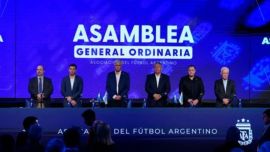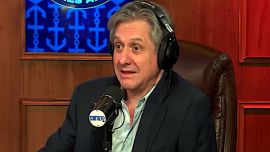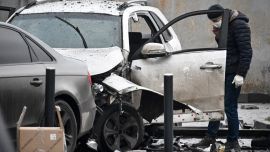While Venezuela’s acute crisis can be plausibly attributed to President Nicolás Maduro’s terror of the dire consequences following loss of power, the woes recently assailing ex-president Alberto Fernández might be less extreme but hardly encouraging any top dog to go gently into that good night of political demise. Although Fernández could not be described as deploying absolute power when in office nor as hitting rock bottom now, his reversal of fortune less than eight months after vacating the Olivos presidential residence is steep indeed with his reputation in shreds as an accused influence-trafficker and wife-basher.
But perhaps the perils of post-presidential posterity warrant a broader context than the problems of Maduro and Alberto Fernández at the centre of this month’s news. If vice-presidents have historically been a pebble in the shoe for heads of state, ex-presidents have also been a factor worthy of mention (almost needless to say, Cristina Fernández de Kirchner has been both). This column will therefore look at the afterlife of the presidents since the return of democracy in 1983, regardless of whether dramatic or mundane.
Radical Raúl Alfonsín (1983-1989) remained politically as well as physically alive for two decades after rampant hyperinflation forced him to quit office five months early in mid-1989. The catastrophic end of his presidency nevertheless left his prestige almost intact, perhaps because he remained associated with its far more auspicious start – the return of democracy in 1983. If Alfonsín volunteered his famous self-criticism of things he could not, would not or did not know how to do (presumably referring to biting the bullet with state reform), dipping his hands into state coffers should be included among the things he could not, would not and did not know how to do – a zero corruption making him an almost unique case of an executive stint not followed by judicial trials and tribulations.
After leaving the presidency, Alfonsín continued as Radical party chairman until the 1991 midterms when a subpar performance falling below 30 percent and an attempt on his life during the campaign (the revolver jammed just like against Cristina far more recently) prompted his resignation. In 1992 he helped form the Movement for Social Democracy (MODESO, in its Spanish acronym) in order to approximate the party to the Socialist International (which it joined in 1996) but the Radicals barely finished on the other side of 30 percent in the 1993 midterms, leading Alfonsín to conclude that Peronist dominance was irreversible and seek ways of diluting it via negotiating the Olivos Pact with then-president Carlos Menem. This took the form of gifting Menem re-election in exchange for such moves towards parliamentary democracy as a quasi-premier Cabinet chief and a third senator to beef opposition representation, all enshrined in the 1994 constitutional reform where the ex-president was a delegate.
But the Olivos Pact was widely perceived as a Radical sell-out, causing the party to fall below 20 percent in the 1995 presidential elections and finish third for the first time in its history. Formation of the Alliance with the FREPASO centre-left grouping in 1997 was more the work of the Radical National Committee chairman Rodolfo Terragno than Alfonsín, who became increasingly estranged with the centre-right tilt of the Fernando de la Rúa presidency following the coalition’s nationwide victory in 1999. Abandoning a Senate seat after only eight months in mid-2002, both his health and political activity began fading away. A heavy smoker, he died of lung cancer in March, 2009.
Menem had both a longer and bumpier post-presidential afterlife than Alfonsín. After being denied a bid for a third term in 1999, he sought consolation in a 2001 marriage with Chilean ex-model and television personality Cecilia Bolocco (the 1987 Miss Universe), a bond lasting six years. But he had barely returned from his honeymoon when he was arrested on charges of gun-running to Ecuador and Croatia, undergoing five months of house arrest before being acquitted by the Supreme Court he had packed during his presidency (an acquittal only confirmed 10 years later by a lower instance while a revival of this trial in 2017 was quashed the following year). His acquittal on charges of covering up the 1994 terrorist car-bomb destruction of the AMIA Jewish community centre came even later, in 2019 (only to be convicted the following month for the soft sale of the Palermo exhibition grounds to the Rural Society), while in 2015 he was banned from public office for life for irregular government salary bonuses.
In 2003 Menem sought a presidential comeback and actually won a five-pronged race in the first round with 24.5 percent of the vote, only to back out of the run-off against fellow-Peronist Néstor Kirchner when assured that he would receive even less votes there. The last 16 years of his life were spent occupying a Senate seat for his native La Rioja, which granted him considerable legal immunity but where he was singularly passive, doing little more than vote against grain export duties in 2008 and against abortion in 2018. He died in his 91st year on Saint Valentine’s Day, 2021.
If De la Rúa won the presidency on the back of the slogan “They say I’m boring” appealing to those craving a more normal country, the same adjective could be applied to his presidential afterlife. Not that being boring saved him from being taken to court over the violent end to his presidency, the 2000 Senate bribery scandal and the megacanje debt bond swap but by 2009 he had been acquitted on all charges. His health was already failing while president and he finally died on the patriotic date of July 9, 2019.
This column will now do a fast forward to 2015, skipping the three presidencies in 10 days between De la Rúa and Eduardo Duhalde (not to mention the presidential morning of Federico Pinedo in 2015), the somewhat longer 2002-3 caretaker presidency of Duhalde (still alive but squeezed out of politics in the 2005 midterms by the Kirchners after helping them to power) and Néstor Kirchner, whose presidential afterlife lasted just 34 months (the last half of that period as a national deputy although more active with UNASUR) before dying in the bicentennial year of 2010.
The latter’s widow has been out of office for less than nine years, two of them spent as a senator (2017-2019) and four as vice-president (2019-2023). In September, 2022, she was the target of an assassination attempt by a candy floss gang now on trial and three months later she was sentenced to six years and banned from future office for the fraudulent allocation of Santa Cruz highway contracts to crony capitalists, the tip of an iceberg of corruption cases.
Her successor Mauricio Macri (2019-2023) has spent much of his time since abroad in activities related to football and bridge as well as writing a couple of books, only returning last May to head the PRO centre-right party he founded and whose support he was decisive last year in throwing behind the Javier Milei candidacy (tenser relations since). He also faces his share of court cases.
The president afterlives of Fernández de Kirchner and Macri are both stories to be continued, as is very much more immediately that of Alberto Fernández at the centre of current news.




















Comments